Over on Hackaday, a good history of Hershey fonts, a still-surviving vector font format designed for use in the 1960s for optical cathode ray printers, printing characters onto microfilm at a time when computer displays were still a novelty (now they are useful for CNC milling, laser etching, etc.).
Tag: 1960s
-
Hershey Fonts
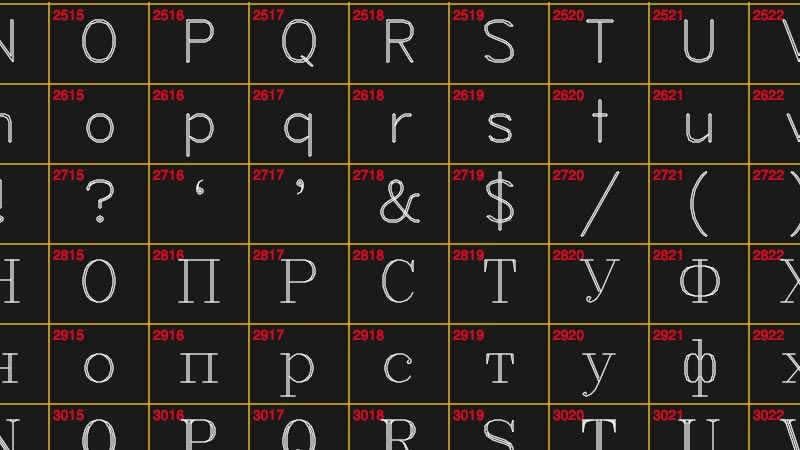
-
Antonio Prohías, Cuban émigré creator of Spy vs. Spy
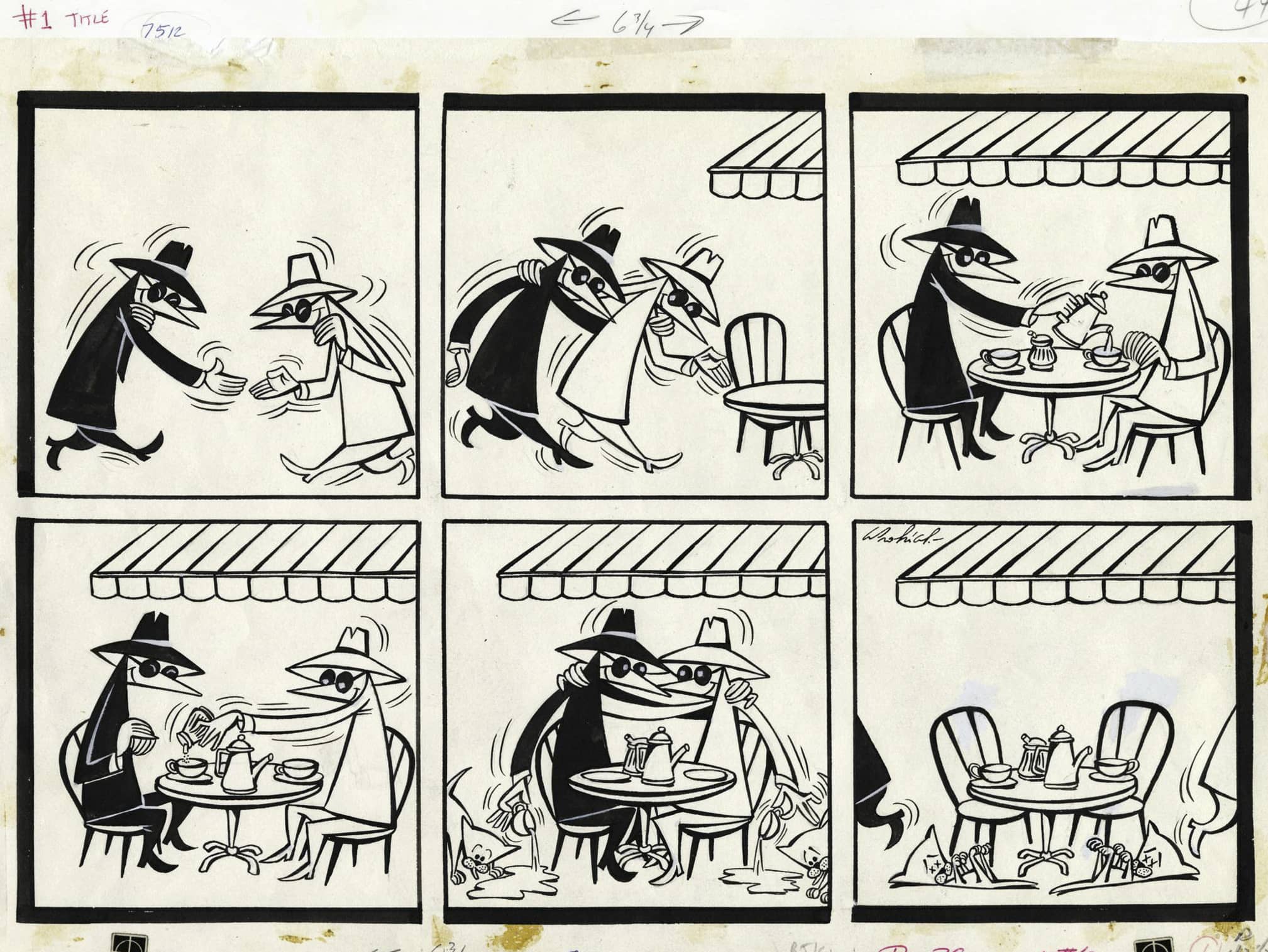
Image credit: Heritage Auctions By the time I was reading MAD Magazine as a kid, Antonio Prohías had already finished his run of the iconic Spy vs. Spy feature that ran every month, passing it along to a new artist in 1987 after illustrating 241 strips. I only recently learned that Prohías was already an established political cartoonist and satirist in Cuba by the time he immigrated to the U.S. in 1961, himself an accused spy after fleeing Castro’s clampdown on the free press:
In 1946, Prohías was given the Juan Gualberto Gómez award, recognizing him as the foremost cartoonist in Cuba. By the late 1940s, Prohías had begun working at El Mundo, the most important newspaper in Cuba at the time. In January 1959, Prohías was the president of the Cuban Cartoonists Association; after Fidel Castro seized power, he personally honored the cartoonist for his anti-Batista political cartoons. But Prohías soon soured on Castro’s actions of muzzling the press. When he drew cartoons to this effect, he was accused of working for the CIA by Fidel Castro’s government. Consequently, he resigned from the newspaper in February 1959.
With his professional career in limbo, Prohías left Cuba for New York on May 1, 1960, working in a garment factory by day and building a cartoon portfolio for Mad by night. Ten weeks later, he walked into Mad’s offices unannounced. He spoke no English, but his daughter Marta acted as an interpreter for him. Before he’d left, he had an $800 check and had sold his first three Spy vs. Spy cartoons to Mad. […] During an interview with the Miami Herald in 1983, Prohías gloated, “The sweetest revenge has been to turn Fidel’s accusation of me as a spy into a moneymaking venture.”
The rest of the magazine’s humor hasn’t entirely aged as well, but I’m still sad to think about a world without MAD.
-
Low-rated and barely animated, Rocky & Bullwinkle became a TV touchstone
From a good Onion AV Club writeup of the low-budget success of moose-and-squirrel:
Meanwhile, the two friends are targeted by Boris and Natasha and a couple of Moon Men, who want to sabotage the space program, lest their home fill up with tourists. There are also plot complications involving Rocky and Bullwinkle’s seafaring friend Captain Peter Peachfuzz; Boris and Natasha’s boss, Fearless Leader; the Abominable Snowman; and a blight that almost wipes out the world’s supply of mooseberries. As the weeks go by and the show keeps adding to the plates spinning in the air, it’s easy to imagine that the writers may have thought that the network was postponing cancellation because someone high up was curious to see how long they could keep this shit up.
The whole Rocky & Bullwinkle series is on Netflix in pretty decent condition (it’s been re-re-edited into many different formats over the years) if you need to fill a few hundred hours of your life!
-
First Computer Graphics Film at T Satellite
Now that I have a retina display, I want a screensaver that looks as good as this 1963 AT&T microfilm video:
This film was a specific project to define how a particular type of satellite would move through space. Edward E. Zajac made, and narrated, the film, which is considered to be possibly the very first computer graphics film ever. Zajac programmed the calculations in FORTRAN, then used a program written by Zajac’s colleague, Frank Sinden, called ORBIT. The original computations were fed into the computer via punch cards, then the output was printed onto microfilm using the General Dynamics Electronics Stromberg-Carlson 4020 microfilm recorder. All computer processing was done on an IBM 7090 or 7094 series computer.
-
The visibilizing analyzer
The Language Log on how science fiction often misses the mark with predictions of technology (the why is up for debate, of course):
Less than 50 years ago, this is what the future of data visualization looked like — H. Beam Piper, “Naudsonce”, Analog 1962:
She had been using a visibilizing analyzer; in it, a sound was broken by a set of filters into frequency-groups, translated into light from dull red to violet paling into pure white. It photographed the light-pattern on high-speed film, automatically developed it, and then made a print-copy and projected the film in slow motion on a screen. When she pressed a button, a recorded voice said, “Fwoonk.” An instant later, a pattern of vertical lines in various colors and lengths was projected on the screen.
This is in a future world with anti-gravity and faster-than-light travel.
The comments that follow are a great mix of discussion about science fiction writing (why do the galactic scientists in Asimov’s Foundation rely on slide rules?) and 1960s display technology limitations (vector vs. raster, who will win?). I like this site.
-
Ibm Selectric Turns 50
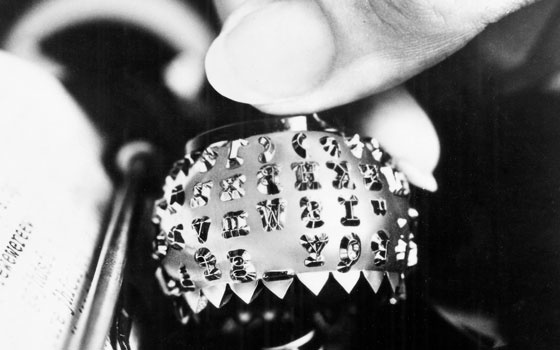
It’s the 50th anniversary on Sunday of the IBM Selectric, the typewriter that revolutionized modern office equipment. Removing those antiquated mechanical keys attached to individual type bars, the Selectric introduced the crazy golf ball thing seen above, rapidly rotating the correct letter into place before striking the paper (unlike older typewriters, the paper stayed put and the ball + ink ribbon moved). Users could even swap out their golf ball for one of many with a different font set, a feature now taken for granted with our magical computers.
Retro-sexy enough to be featured in the 1960 world of Mad Men (the model they use is somewhat anachronistic), solid enough to be Hunter S. Thompson’s preferred machine (his was red), but with enough geek cred to be used as an electromechanical computer terminal interface (six-bit character encoding!).
My office’s supply room still stocks some of these balls, even though I can’t imagine there are many typewriters left. I’d better go stock up.
(Via El Reg)
-
IBM 2250 Graphics Display
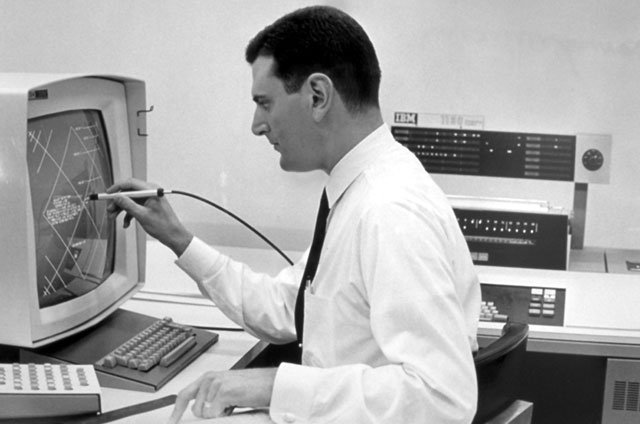
The IBM 2250 graphics display, introduced in 1964. 1024×1024 squares of vector-based line art beamed at you at 40Hz, with a handy light pen cursor. Much more handy than those older displays that just exposed a sheet of photographic film for later processing!
(Via Columbia University, via Ars Technica’s recent quick primer on computer display history)
-
Delia Derbyshire Interview
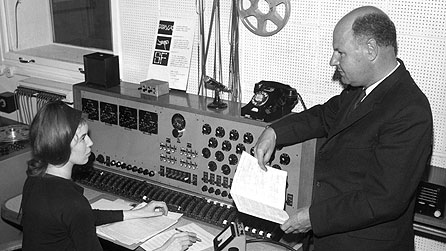
The BBC will be airing a never-before-seen interview this week with Delia Derbyshire, the woman who co-composed and performed the original Doctor Who theme, probably the most famous piece of purely electronic music. For a great account of the production (no synths back then, only novel, painstaking work involving test tone equipment, razor blades and tape!), check out Mark Ayres’s A History of the Doctor Who Theme.
(The interview will air on Inside Out, November 15 at 7:30pm on BBC One – not sure when/if those of us not in the UK will be able to see it, though…)
